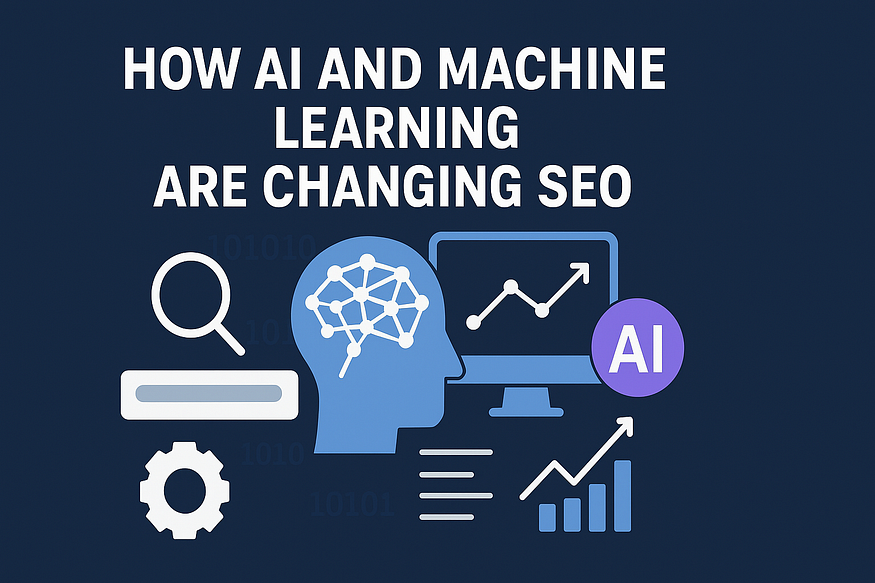Search Engine Optimization (SEO) has always been a game of adapting to algorithm updates, user behavior changes, and new technologies. But with Artificial Intelligence (AI) and Machine Learning (ML) becoming core parts of search engines, the SEO landscape is undergoing a deeper transformation.
In this blog, we’ll explore:
- What roles AI and ML play in SEO today
- Key changes and new challenges
- Practical strategies you can adopt

What Do AI and Machine Learning Mean in SEO?
- AI (Artificial Intelligence) refers to systems capable of performing tasks that normally require human intelligence — like understanding language, making predictions, and learning from data.
- Machine Learning is a subset of AI: models that learn patterns from data and improve over time without being explicitly programmed each time.
In SEO, AI and ML power search engines to interpret content, understand user intent, rank pages, detect spam, and more.
According to Search Engine Journal, enterprise SEO strategies are being shaped by AI as users shift from keyword-based queries to context-based interactions. Search Engine Journal
Lumar explains how AI-augmented SERP features like Google’s AI Overviews and large language models (LLMs) are redefining what “ranking” means.
Key Ways AI & ML Are Changing SEO
Here are the major shifts AI and ML are bringing into SEO in recent years:
1. Smarter Understanding of Content & Intent
Instead of matching keywords, AI models (especially those used in search) analyze context, semantics, and user intent. They ask: What is the user really looking for?
BrightEdge notes that modern search engines don’t only rely on indexing keywords, but prioritize intent and context to generate personalized answers.
This means SEO content must go deeper — offering clarity, structure, and relevance beyond just keyword insertion.
2. AI-Generated Summaries & Overviews
Google and other platforms now provide AI Overviews (or generative answers) at the top of search results. These summaries often draw from multiple web pages to give a direct answer.
As a result, users sometimes don’t click through — they get the information right there. This is shifting how organic traffic behaves.
3. Smarter Content Creation & Optimization
AI tools are being used to:
- Suggest optimized titles, headings, meta descriptions
- Propose topics or content outlines
- Help with keyword expansion and clustering
- Assist in rewriting or expanding content
These tools don’t replace human writers, but they help scale and refine content development.
Machine learning models can analyze large datasets (search volume, clicks, user behavior) to predict rising keywords or topics. This gives marketers a head start on content planning.
5. User Experience & Engagement Signals
Search engines increasingly use behavioral signals — like click-through rate (CTR), time on page, bounce rate, scroll depth — to evaluate content quality. AI systems analyze these signals to adjust rankings or detect content that doesn’t satisfy users.
6. Automation in Technical SEO
AI/ML helps with automating certain technical SEO tasks, such as:
- Identifying and correcting crawl errors or broken links
- Improving page load speed diagnostics
- Detecting duplicate or thin content
- Recommending schema or structured data additions
These tools can scan vast sites and flag issues much faster than manual audits.
Challenges & Risks to Be Aware Of
- Overreliance & “AI content” pitfalls
Blindly trusting AI-generated content may lead to shallow articles, lack of originality, or even factual errors (hallucinations). Always review and add your added value. - Traffic dip due to zero-click results
As AI overviews answer queries directly, fewer users may click through to your site. Some “informational” queries may lose traffic. - Opacity of AI ranking criteria
We don’t fully know how generative models choose which sources to cite. Trying to reverse-engineer it is speculative. - Constant evolution
AI and ML models evolve. Strategies that work today may need adjustments tomorrow.
Strategies to Adapt & Thrive
Here are practical steps for you (or alfacoders.in) to stay competitive in this AI-driven SEO world:
- Focus on Quality & Depth
Go deep with your content. Use data, case studies, unique insights — content that is hard to replicate purely by AI. - Structure For AI
Use clear sections, definitions, FAQs, bullet lists. That helps AI models extract and cite content. - Use Schema / Structured Data
Apply FAQ, HowTo, Article markup so machines understand your content’s purpose. - Optimize for People First
Even though AI matters, your primary audience is humans. Clarity, readability, relevance should come first. - Monitor AI Visibility
Check how your pages show up in ChatGPT, Google AI Overviews, Perplexity, etc. Adjust content where needed. - Leverage Brand & Authority
AI systems may prefer websites with strong brand reputation, backlinks, mentions. Work on building authority, citations, guest posting. - Iterate Continuously
Update old posts, refine structure, add new sections. AI models value fresher, well-maintained content.
How alfacoders.in Can Apply These
- If alfacoders has a blog on digital marketing or SEO, restructure key posts using clear headings, FAQs, and definitions to make them AI-friendly.
- Link internally: e.g. “Read more about technical SEO techniques in our SEO services page at alfacoders.in/seo-services.”
- Publish in-depth guides (2,000+ words) on trending subtopics (e.g. “AI-Driven Keyword Research”) and interlink them.
- Add schema markup (FAQ, HowTo) to your articles — especially for core topics where AI might extract answers.
- Promote brand reach (social media, collaborations) so that your site gains mentions and backlinks.
Conclusion
AI and Machine Learning are no longer peripheral in SEO — they’re central. They’re changing how content is understood, how it’s ranked, and how users find answers.
By embracing deeper content, structuring intelligently, building authority, and adapting continuously, alfacoders (and your other digital properties) can not just survive but thrive in this new era.